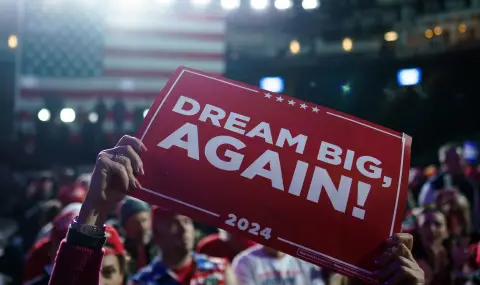The US has long been considered a model of democracy - a country that other nations have measured themselves against when building their democratic institutions.
On January 6, 2021, the world turned its attention to the United States. On that day, extremists, incited by President Donald Trump, stormed the Capitol in an attempt to stop the democratic transfer of power after the 2020 elections. According to a 2023 survey by the "Associated Press” with the assistance of the University of Chicago, only 10% of respondents said that democracy in the US works extremely or very well. What is its state now - before the presidential election?
The US Congress does not inspire confidence in democracy
"Right now, Americans do not have much confidence in government institutions," says Michael Berkman, director of the "McCourtney" Institute for Democracy and a professor of political science at Pennsylvania State University. "They see a Congress that is not functioning well at all, and they see some intractable problems that the government has not dealt with, such as guns and climate change."
The paralysis of Congress by the Republican majority in October 2023 also had this effect - for a long time they were unable to elect a speaker. But even without such interruptions - the adoption of laws and their passage through both houses of parliament is slow and extremely complicated because of the divisions between Democrats and Republicans. "This is a very serious impossibility of working in Washington", says Vanessa Williamson of the American think tank Brookings Institution.
The US was threatened by the impossibility of handing over power peacefully
The polarization of society and the huge gap between supporters of Democrats and Republicans means that at least half the country will certainly be unhappy with the government's decisions, whatever they are.
After the elections 4 years ago, many Republicans, led by Donald Trump, were so unhappy with the election result that they decided to ignore it and claimed that the election had been "stolen" from them. This led to the storming of the Capitol. "I think what happened on January 6th, the refusal of one side to accept the election results, was a very serious blow to democracy - the acceptance of the election is at the heart of democratic politics," says Berkman.
The Electoral College - The Total Votes Are Not the Most Important
It is not surprising that trust in democratic institutions has declined in recent years. "In addition to the erosion of trust in democracy, however, the United States has many anti-democratic practices that are long-standing" says Williamson. The most important of these - the winner of the election is not necessarily the one who received the most votes.
Donald Trump won the 2016 presidential election, even though his opponent Hillary Clinton received about 2.9 million more votes than him. The reason for this is the Electoral College. In the United States, each state has a certain number of electors, depending on its population. The candidate who wins the majority of the votes cast in a given state receives the electoral votes from that state. Sounds complicated? Here's an example.
California, as the state with the most population, has the most electors in the Electoral College: 54. The candidate who manages to get the most Californians to vote for him will receive all 54 electoral votes, even if he wins the election in California by a small margin. Smaller states like Vermont or South Dakota only have three electoral votes, but the system is the same. To win the presidency, a candidate must win enough states to collect at least 270 electoral votes. Thus, a candidate who wins the states by a small margin can become president - regardless of the fact that more Americans may have voted for the other candidate.
The Senate - a "deeply undemocratic institution”
Another part of the American political system that is not a reflection of perfect democracy is the upper house of parliament - the Senate. Each American state has two senators - no matter how big the state is. This means that for some states one senator represents several hundred thousand people, and in others - several million. When the Senate makes decisions, the vote of each senator has the same weight, even though they represent different numbers of people.
Burkman calls the Senate a "deeply undemocratic institution”. According to Williamson, this is a result of the way the Senate is structured - "the most populous regions of the country are extremely underrepresented in the legislative process".
More people's participation?
The United States may not be a model of democracy, but Americans have not given up on the idea. A large percentage of them are actively involved in political and civic life.
Voter turnout in 2020 was over 65% - higher than it has been in the last 100 years. "We've seen an increase in political activity in the last eight, 10 years. I think that's very important," says Berkman.
Author: Carla Bleiker
